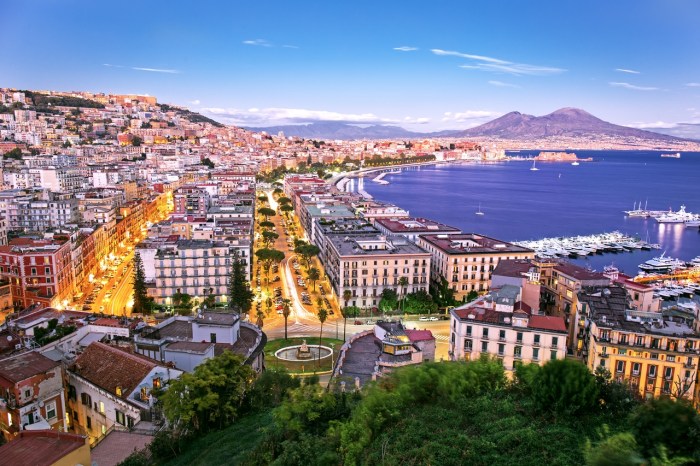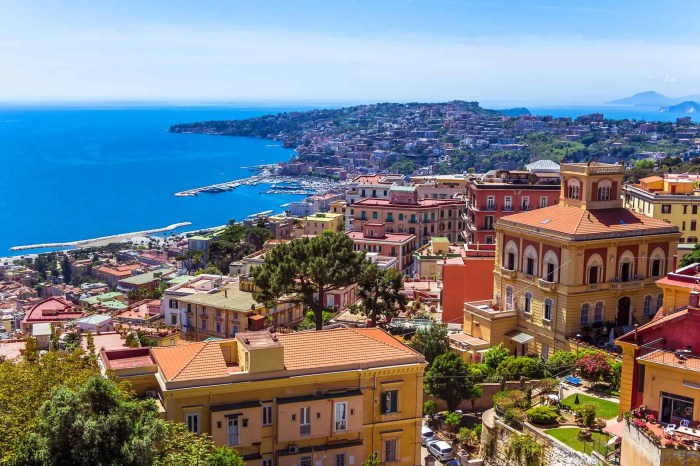Italian port city often credited as the home of pizza – Naples, the vibrant Italian port city, is widely recognized as the birthplace of pizza. Its culinary significance extends beyond its delectable taste, as it has become deeply intertwined with the city’s cultural identity and economic prosperity.
Pizza, with its humble origins in Naples, has evolved into a global culinary phenomenon. Its unique characteristics, distinct from other regional variations, have captivated taste buds worldwide.
Introduction
The Italian port city of Naples holds the esteemed reputation as the birthplace of pizza. Its culinary legacy dates back to the 18th century, when humble street vendors began selling flatbreads topped with simple ingredients such as tomatoes, cheese, and herbs.
Culinary Significance

Neapolitan pizza is distinguished by its unique characteristics that set it apart from other regional variations. The dough is made with a blend of high-quality flour, water, yeast, and salt, resulting in a thin, pliable crust with a characteristically chewy texture.
The tomatoes used are typically San Marzano tomatoes, known for their sweetness and acidity, which are crushed and cooked into a rich and flavorful sauce. The cheese is traditionally Mozzarella di Bufala Campana, a soft, creamy cheese made from the milk of water buffalo, providing a milky and slightly tangy flavor.
Cooking Techniques, Italian port city often credited as the home of pizza
The cooking technique is also crucial in achieving the authentic Neapolitan pizza. The pizzas are baked in wood-fired ovens at extremely high temperatures, typically around 900 degrees Fahrenheit, for a short period, usually between 60 to 90 seconds. This intense heat creates a crispy exterior while leaving the center of the pizza soft and moist.
Flavors
The combination of the fresh, high-quality ingredients and the unique cooking technique results in a pizza with a complex and harmonious flavor profile. The sweetness of the tomatoes, the saltiness of the cheese, the herbaceousness of the basil, and the subtle smokiness from the wood-fired oven create a balanced and satisfying taste experience.
Cultural Heritage
Pizza has become deeply ingrained in the cultural identity of Naples. It is a symbol of the city’s cuisine and a source of local pride. The streets are lined with pizzerias, each with its own unique take on the classic dish, and the aroma of freshly baked pizza fills the air.
Local Pride
Neapolitans take great pride in their pizza and its status as a culinary icon. The city hosts an annual pizza festival, the Pizza Village, which attracts visitors from around the world to celebrate the art of pizza making. Pizza is also an integral part of local traditions and celebrations, such as weddings and religious holidays.
Economic Impact
The pizza industry has a significant economic impact on Naples. The city’s tourism industry is largely driven by the desire to experience authentic Neapolitan pizza, and many visitors come specifically for that purpose. Pizza-related businesses, such as pizzerias, suppliers, and cooking schools, contribute to the city’s economy and create employment opportunities.
Tourism
Naples has become a culinary destination for tourists from all over the world. Visitors flock to the city to sample the authentic Neapolitan pizza and experience the vibrant atmosphere of its pizzerias. The city’s tourism industry benefits greatly from this influx of visitors.
Global Influence

Neapolitan pizza has had a profound global influence, becoming a beloved dish worldwide. It has inspired countless variations and adaptations in different countries and cultures, from New York-style pizza to Chicago deep-dish pizza. The popularity of Neapolitan pizza has contributed to the spread of Italian cuisine and culinary traditions around the world.
Modern Innovations
While Neapolitan pizza remains a classic, chefs and restaurateurs are constantly innovating and creating new variations inspired by the traditional style. Some modern interpretations include the use of different flours, such as whole wheat or gluten-free, and the incorporation of unique toppings, such as artisanal cheeses, gourmet meats, and seasonal vegetables.
Reinterpreting Classic Recipes
These modern innovations showcase the versatility of Neapolitan pizza while staying true to its culinary heritage. Chefs experiment with new ingredients and techniques to create dishes that honor the tradition while also appealing to contemporary tastes.
Culinary Tourism: Italian Port City Often Credited As The Home Of Pizza

Naples offers a unique culinary tourism experience for those seeking to immerse themselves in the authentic pizza culture. Visitors can embark on a culinary tour to explore the city’s renowned pizzerias, attend cooking classes to learn the art of pizza making, and visit local markets to discover the fresh ingredients used in Neapolitan pizza.
Itinerary
A suggested itinerary for a culinary tour of Naples might include visits to the following establishments:
- Pizzeria da Michele, known for its classic Margherita pizza
- Pizzeria Starita, famous for its fried pizza
- Pizzeria Brandi, said to be the birthplace of the Margherita pizza
- Cooking class at the Associazione Pizzaiuoli Napoletani, to learn the secrets of pizza making
- Visit to the Mercato di Porta Nolana, a bustling market offering fresh produce and local delicacies
FAQ Section
Is pizza truly from Naples?
Yes, Naples is widely credited as the birthplace of pizza, with its origins dating back to the 18th century.
What makes Neapolitan pizza unique?
Neapolitan pizza is distinguished by its thin, chewy crust, made with a specific type of flour and cooked in a wood-fired oven. The toppings are typically simple and fresh, such as tomatoes, mozzarella cheese, and basil.
Why is pizza so important to Naples?
Pizza is deeply rooted in Neapolitan culture and identity. It is a symbol of the city’s culinary heritage and a source of local pride.